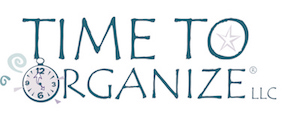professional organizer explorer frequently asked questions
 Every week, I respond to a fun assortment of career-related inquiries from people all over the world. They want to know if becoming a professional organizer is the right career path for them. Questions range from the basic “How much money can I make?” and “What do you pack in your take-along bag?” to the more complex “How long does it take to organize a kitchen?” and “How do you stay safe in a stranger’s home?”
Every week, I respond to a fun assortment of career-related inquiries from people all over the world. They want to know if becoming a professional organizer is the right career path for them. Questions range from the basic “How much money can I make?” and “What do you pack in your take-along bag?” to the more complex “How long does it take to organize a kitchen?” and “How do you stay safe in a stranger’s home?”
While I am happy to answer basic inquiries, I usually recommend that these folks start by reading my book, Born to Organize. It will answer nearly all of a career explorer’s business start-up questions. Then, if someone wants to go more in-depth, I offer in-person, phone, and email coaching. I love chatting with prospective professional organizers and sharing everything I’ve learned!
But, of course, you may have some questions that you want to be answered right now. So, here are a few of the most frequently asked questions and my answers. I hope they point you in the right direction.
All my best,
![]()
is this a good time to enter the professional organizing industry?
In one word, yes! Our industry is enjoying fast-paced growth due to demand from consumers. People have too much stuff, not enough space or time, and lack basic organizing skills. They desperately need professional organizers. And thanks to television shows like “Hoarders,” the topic of organizing has become hot, hot, hot! To give you an idea of growth, consider these numbers: In 1995, there were a mere 834 members of NAPO (National Association of Professional Organizers.) Within five years, that number grew to 1,358. Now, there are well over 4,000! Our field is growing not only due to consumer demand but also because it is a relatively easy and flexible business to launch.
what type of certification or training do I need to become a professional organizer?
To become a professional organizer, you don’t need any special certification or specific training. Of course, there are helpful teleclasses, webinars, websites, and books that you’ll want to explore. I recommend you start by reading my book, Born to Organize. It is very comprehensive and will answer many of your questions. There is a certification from the Board of Certified Professional Organizers® (BCPO) that you may consider obtaining after you’ve been in business for a while. However, to become a Certified Professional Organizer®, you’ll need at least 1500 hours of paid experience over the past three years. So don’t get hung up on any type of certification program at this point. While training is generally a good thing, you can certainly get started without paying for any type of certification or lengthy education courses if you wish.
could you briefly outline the process of helping clients?
I start with a brief phone consultation to qualify them. (Will they be a good match for me and I for them?) At the first session, I spend anywhere from 30-60 minutes doing an on-site assessment using my Client Assessment Form. Then we dig in for the remainder of the time (usually three hours per session). I work alongside them the entire time, coaching, teaching skills, setting up new systems, watching for fatigue, and encouraging them. When we wrap up, I offer homework assignments if they want to work on them between sessions on their own. It gives them accountability and gets the project done faster.
do you bring organizing supplies or have the client purchase them?
I always bring my label maker, as well as a small arsenal of basic organizing supplies that work in just about any situation. (The list is included in my book, Born to Organize.) Beyond the basics, if clients ask for product recommendations, I give them. However, a lack of storage containers is not usually the problem. Of course, there are some fabulous organizing products out there (peruse my blog for some of my favs), and they make organizing so much more fun for both me and my clients. But I always work within my clients’ budgets and first, try to use what they already own.
do i need insurance?
Yes, for sure. You can purchase “general liability” which covers property damage and bodily injury. But I recommend “professional liability” (also called “errors and omissions”), which also covers the advice that you give clients. NAPO members can purchase this type of plan through NAPOSure. If you are not a member, ask your trusted friends or local business owners for recommendations.
what is the best way to market my business?
If you have a business, you need a website. If you’re not sure how to create a fabulous, effective website, I can help! Also, you’ll want to maximize social media: Create a Facebook business page, Twitter, and Pinterest accounts. Also, sending a monthly e-newsletter will help you stay in touch with prospects regularly. Some organizers join local networking groups and/or give workshops to become more visible in their communities. There are many low-cost methods to promote your business!
how much money can i make as a professional organizer?
The amount of money you make depends on the number of client hours you have. The rate you charge depends upon where you live (rural, urban, suburban), what type of organizing you’re doing, and how long you’ve been organizing. I would caution against setting your fee too low. Many newer organizers don’t think they’re worthy of the standard organizing fees, which is a huge misnomer. I usually recommend at least $40 – $50 per hour for brand-new organizers (and I’ve known plenty who have started at $60+), but that will vary depending upon the factors listed above. Rates nationally vary from $40 to over $200 per hour.
should i work with hoarders?
Working with people in hoarding situations is not for everyone. It takes immense patience, training, and often a team approach. Do not attempt to work with hoarders until you have specific training. The Institute for Challenging Disorganization is a good resource for educational opportunities, plus it’s a good place to find referrals if you don’t feel comfortable working with hoarding clients.
what portion of society do your clients come from — geographically, economically, and socially?
They come from all areas… mostly I accept clients who live close to me (within 30 miles) as a personal preference. They tend to be more suburban rather than in the city, maybe because I’m in a suburb, too. My target market is busy families. Economically, it’s all over the place… I’ve had a few lower-income clients, some upper-income clients, and lots of middle-income clients. Those who want to hire a professional organizer will usually find a way to afford it, even if they have to do some serious budgeting to fit it in. It’s important for us, as professional organizers, to stress the value of our services. Our clients are learning skills from us that will last a lifetime.
Still have questions? Here are three options to move you forward:
- Buy a copy of Born to Organize. It’s available in PDF on this website or Amazon.
- Contact Time to Organize to set up a phone coaching session.
- Check out some additional tips here, including how to select a company name.
Best wishes as you consider a career as a professional organizer!
